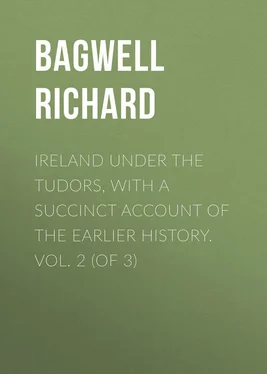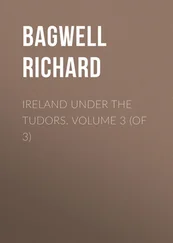Richard Bagwell - Ireland under the Tudors, with a Succinct Account of the Earlier History. Vol. 2 (of 3)
Здесь есть возможность читать онлайн «Richard Bagwell - Ireland under the Tudors, with a Succinct Account of the Earlier History. Vol. 2 (of 3)» — ознакомительный отрывок электронной книги совершенно бесплатно, а после прочтения отрывка купить полную версию. В некоторых случаях можно слушать аудио, скачать через торрент в формате fb2 и присутствует краткое содержание. Жанр: foreign_antique, foreign_prose, Историческая проза, на английском языке. Описание произведения, (предисловие) а так же отзывы посетителей доступны на портале библиотеки ЛибКат.
- Название:Ireland under the Tudors, with a Succinct Account of the Earlier History. Vol. 2 (of 3)
- Автор:
- Жанр:
- Год:неизвестен
- ISBN:нет данных
- Рейтинг книги:4 / 5. Голосов: 1
-
Избранное:Добавить в избранное
- Отзывы:
-
Ваша оценка:
- 80
- 1
- 2
- 3
- 4
- 5
Ireland under the Tudors, with a Succinct Account of the Earlier History. Vol. 2 (of 3): краткое содержание, описание и аннотация
Предлагаем к чтению аннотацию, описание, краткое содержание или предисловие (зависит от того, что написал сам автор книги «Ireland under the Tudors, with a Succinct Account of the Earlier History. Vol. 2 (of 3)»). Если вы не нашли необходимую информацию о книге — напишите в комментариях, мы постараемся отыскать её.
Ireland under the Tudors, with a Succinct Account of the Earlier History. Vol. 2 (of 3) — читать онлайн ознакомительный отрывок
Ниже представлен текст книги, разбитый по страницам. Система сохранения места последней прочитанной страницы, позволяет с удобством читать онлайн бесплатно книгу «Ireland under the Tudors, with a Succinct Account of the Earlier History. Vol. 2 (of 3)», без необходимости каждый раз заново искать на чём Вы остановились. Поставьте закладку, и сможете в любой момент перейти на страницу, на которой закончили чтение.
Интервал:
Закладка:
These were the days when everyone expected Elizabeth to marry. Cecil went to Scotland, where the general wish was that the half-witted Arran should unite the two kingdoms. On his return he found that his policy had been thwarted by ‘back counsels;’ and he talked of resigning his place. Sussex wrote in horror at the prospect, for he thought the Queen would be but slenderly provided with counsel elsewhere, and under certain circumstances, such perhaps as a Dudley ministry, he himself would not serve ten months in Ireland – no, not for 10,000 l. The dark tragedy on the staircase at Cumnor left Dudley free, and for a moment most men supposed that the Queen’s partiality would end in marriage. Sussex did not take so unfavourable a view of the match as the secretary. According to his view the great national requirement was an heir to the Crown, and there would be a better chance of one if Elizabeth married the object of her affections. Sussex declared himself ready to serve, honour, and obey any one to whom it might please God to direct the Queen’s choice. Had this advice been given to Elizabeth the writer might be suspected of flattery, and of seeking friends of the mammon of unrighteousness; but, spoken to such unwilling ears as Cecil’s, it must be considered highly honourable. 16 16 Sussex to Cecil, Oct. 24 and Nov. 2.
In Ireland as in England, Elizabeth gained great and deserved credit by reforming the coinage. From the time of John till that of Edward IV. there had been no difference between the two standards; but in the latter reign that of Ireland suffered a depreciation of twenty-five per cent. An Irish shilling was henceforth worth no more than ninepence in England. There must have been a loss to the public and a gain to the Exchequer at first, but bullion finds its own level like water, and there were no further fluctuations. Having become a settled and understood thing, the difference caused little trouble. But when Henry VIII. began to tamper with the currency great loss and inconvenience followed. The quantity of silver – the common drudge ’twixt man and man – in any given piece of money could scarcely be guessed at by the ordinary citizen. Barrels full of counterfeit coin were imported, and added much to the confusion. Tradesmen raised prices to save themselves. All good coin was exported to buy foreign wares, and the course was continually downwards, as it must inevitably be under similar circumstances. Inconvertible notes proved highly inconvenient in America and in Italy; but they were nothing to the metallic counters of the Tudors, which depended less upon credit than upon uncertain intrinsic values. Communications were difficult, there were no newspapers, and money dealers flourished. At every exchange a burden was imposed on industry. Those who have been in Turkish towns, and have seen a sovereign waste as it passes from one currency to another, can form an idea of what Dublin and Drogheda suffered through the ignorance and dishonesty of the English Government.
What Henry began Edward and Mary continued, and Ireland was deluged with innumerable varieties of bad money. Some of Mary’s shillings were worth little more than the copper they contained. She also by proclamation authorised the adulterated rose-pence of her father and brother to be used in Ireland, though they were prohibited in England. In a paper drawn up for Elizabeth’s Council, five kinds of small coins are enumerated, of every degree of baseness, and of values between 5-1/3 d. and 1-1/3 d. English. One of these, the old Irish groat, was worth threepence, but had several varieties. Thus Dominus groats were those struck before Henry VIII. assumed the royal title, Rex groats were those struck after; none were of a good standard. The quantity of coin no more than three ounces fine was estimated at from 60,000 to 100,000 lbs. To cleanse the Augean stables it was proposed to restore the Irish mint, which had been abandoned for want of silver at the end of Edward VI.’s reign. The repair of the furnaces was begun, wood was cut, and the mixed money was cried down for a recoinage. But the inducements offered proved insufficient, and the merchants hoarded the Irish money instead of bringing it in. The plan was then changed. A reward was offered for bringing in the bad coin, and fresh money was struck in England on the basis of the practice which prevailed from Edward IV. to Henry VIII. Ninepence sterling was fixed as the value of an Irish shilling; some of the old money, particularly that of the lower denominations, seems to have been put in circulation, but it was used merely as counters and was not complained of. The currency question slumbered until 1602, when Elizabeth fell away somewhat from her early virtue, and partially revived the grievance which she had redressed. 17 17 Ware’s Antiquities , by Harris, chap. xxiii.; ‘Le case de mixt moneys’ in Davies’s Reports. There are a great many letters on this subject in the R.O., 1560 and 1561. See particularly the valuation of silver coins, &c., Dec. 1560 (No. 62), several of Feb. 23, 1561; Fitzwilliam to Cecil, May 4; to the Queen May 5; and the Queen’s letter of June 16. See also Queen’s Instructions to Sussex, May 22, 1561, in Carew , and the proclamations near the end of the last volume of that collection.
Kildare had the wit to see that times were changed, and that the Crown would be too strong for any possible combination; but others were less well informed, or more sanguine. Some of the O’Mores held a meeting at Holy Cross in Tipperary, where Neill M’Lice was chosen chief of Leix. The object of this unfortunate clan was of course the retention of their lands, to which they clung with desperate resolution. Shane sent a rymer, one of those improvisatori who were always at hand to carry dangerous messages, bidding them to trust no man’s word, but to wait for orders from him. Desmond was also consulted. According to one account he offered the conspirators a refuge in the last resort; according to another, he had promised to send actual assistance. The matter came to Ormonde’s ears, and he appeared suddenly at Holy Cross, dispersed the meeting, and took three of the principal men prisoners. 18 18 Queen to Sussex, Dec. 15; to Ormonde, Dec. 16, 1560. Examinations of Donell MacVicar, Jan. 14, 1561.
Elizabeth saw that nothing of importance could be done without an effort, and being in one of her frugal moods, she was disinclined to make that effort. She summoned Sussex over for a personal conference, reminding him that she had formerly been charged with other items besides his salary, and suggesting that part of it should now be devoted to the payment of a Lord Justice, ‘which, considering our other charges, we think you cannot mislike.’ As soon as Fitzwilliam’s commission arrived, Sussex left Ireland; but Shane O’Neill did not wish to let the Lord-Lieutenant have the sole telling of the story. Shane was in communication with Philip, who bade him not be discouraged, for that he should not want help. Letters to this effect were brought by the parish priests of Howth and Dundalk, and O’Neill then wrote to the Queen in a very haughty strain. He asked leave to correspond freely with the Secretary, and solicited the admission of his messenger to the Queen’s presence. ‘There is nothing,’ he said, ‘I inwardly desire of God so much’ as that ‘the Queen should know what a faithful subject I mean to be to her Grace.’ For her Majesty’s information, he stated forcibly his case against the Dungannon branch, invariably calling his rival Matthew Kelly, and laying great stress on his own election by the tribe. ‘According,’ he wrote, ‘to the ancient custom of this county of Tyrone time out of mind, all the lords and gentlemen of Ulster assembled themselves, and as well for that I was known to be the right heir unto my said father, as also thought most worthiest to supply my father’s room, according to the said custom, by one assent and one voice they did elect and choose me to be O’Neill, and by that name did call me, and next under your Majesty took me to be their lord and governor, and no other else would they have had.’ The effect had been magical. All the North for eighty miles had been waste, without people, cattle, or houses, ‘save a little that the spirituality of Armagh had,’ and now there was not one town uninhabited. If the Queen would give Ireland into his keeping, she would soon have a revenue where she had now only expense.
Читать дальшеИнтервал:
Закладка:
Похожие книги на «Ireland under the Tudors, with a Succinct Account of the Earlier History. Vol. 2 (of 3)»
Представляем Вашему вниманию похожие книги на «Ireland under the Tudors, with a Succinct Account of the Earlier History. Vol. 2 (of 3)» списком для выбора. Мы отобрали схожую по названию и смыслу литературу в надежде предоставить читателям больше вариантов отыскать новые, интересные, ещё непрочитанные произведения.
Обсуждение, отзывы о книге «Ireland under the Tudors, with a Succinct Account of the Earlier History. Vol. 2 (of 3)» и просто собственные мнения читателей. Оставьте ваши комментарии, напишите, что Вы думаете о произведении, его смысле или главных героях. Укажите что конкретно понравилось, а что нет, и почему Вы так считаете.












